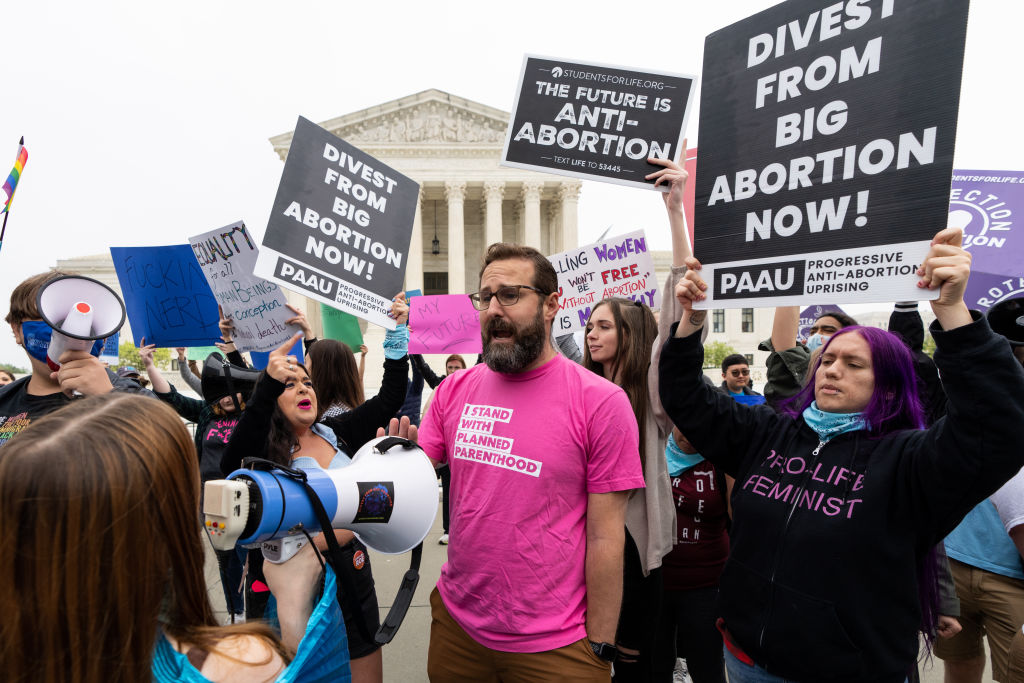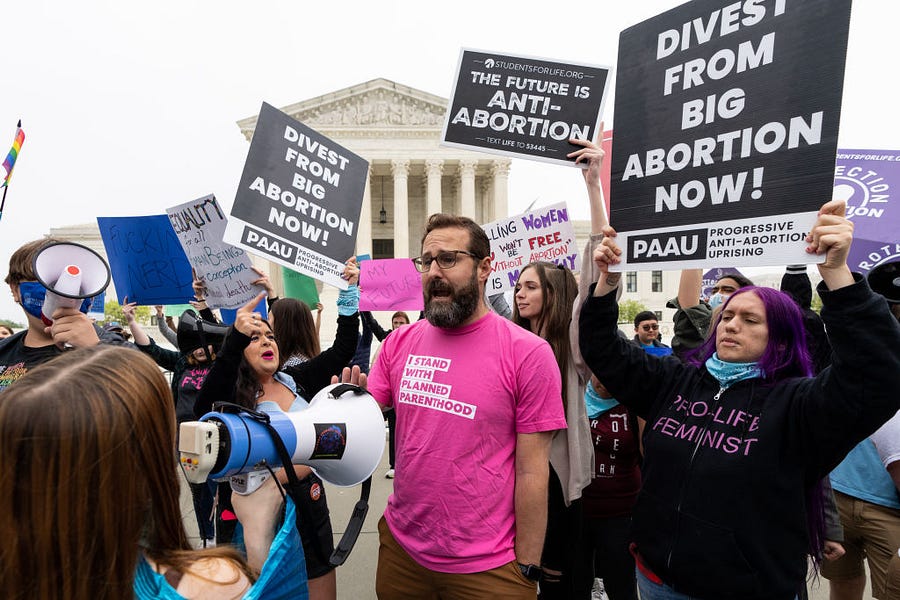Happy Wednesday! Shout out to Daniel Radcliffe, the British actor who will now get to say he’s had the privilege of portraying two of the world’s most magical and awe-inspiring characters to ever grace the silver screen: Harry Potter and … ‘Weird Al’ Yankovic.
Quick Hits: Today’s Top Stories
-
Supreme Court Chief Justice John Roberts confirmed yesterday that the leaked draft of an opinion that would overturn Roe v. Wade is authentic—though not final—and ordered the Marshal of the Court to conduct an investigation into the source of the leak.
-
Ohio and Indiana conducted their 2022 primary elections on Tuesday, with competitive races taking place in both states. Republican author and venture capitalist J.D. Vance will face off against Democratic Rep. Tim Ryan in Ohio’s U.S. Senate race, and incumbent GOP Gov. Mike DeWine will be challenged by Nan Whaley, the Democratic former mayor of Dayton. In Indiana, state Sen. Erin Houchin won the GOP bid to succeed the retiring Rep. Trey Hollingsworth.
-
The Bureau of Labor Statistics reported Tuesday that U.S. job openings reached record highs at the end of March, when there were 11.5 million unfilled jobs nationwide, up from 11.3 million a month earlier. The quits rate—the percentage of workers who quit their job during the month—hit a record high 3 percent as well, though many of these workers quit for different or better opportunities.
-
U.S. Citizenship and Immigration Services (USCIS) announced Tuesday it will extend the work permits of most immigrants whose authorization recently expired or is about to expire, citing the agency’s inability to process applications quickly enough to keep pace with existing labor shortages. The extension—up to a year and a half—is expected to affect about 420,000 immigrants over the course of the policy.
The Day After The Roe Leak

It’s official: The initial draft of a Supreme Court opinion overturning Roe v. Wade that leaked on Monday is the real deal.
That doesn’t mean the ruling itself is set in stone—justices could still change their votes or narrow the decision’s scope before it’s issued later this summer—but Chief Justice John Roberts confirmed yesterday the document published by Politico this week was written by Justice Samuel Alito and circulated in early February.
“To the extent this betrayal of the confidences of the Court was intended to undermine the integrity of our operations, it will not succeed,” he said in a statement. “The work of the Court will not be affected in any way.” The marshal of the court will launch an investigation into the source of the leak.
If the final numbers reflect the split as seen in the leak—again, an important if—Alito’s opinion will overrule nearly five decades of abortion jurisprudence. But as we noted in a recent TMD, a full overturning of Roe and Planned Parenthood v. Casey wouldn’t outlaw abortion nationwide—it would return the power to regulate the procedure to state legislatures and governors, who can be as permissive or restrictive as their voters will allow. At least 17 states have preemptively moved to guarantee abortion’s legality, while at least 13 others have passed “trigger laws” that would implement new restrictions in the event Roe and Casey are reversed. Monday’s news will certainly spur more into action, one way or the other.
Democratic Gov. Gavin Newsom, for example, called on the legislature this week to amend California’s constitution—a process that requires voter approval—so “there is no doubt as to the right to abortion” in the state. “We know we can’t trust the Supreme Court to protect reproductive rights, so California will build a firewall around this right in our state constitution,” he said in a statement. California accounted for about 15 percent of all abortions in the United States in 2017, and in 2019, Newsom signed a proclamation “welcoming women to California” for the procedure.
For as much attention as Monday’s leak has understandably received, it’s far from certain how such a ruling would affect the overall abortion rate. What percentage of women seeking an abortion in states where it’s illegal will undergo the procedure illicitly, or travel to another jurisdiction? Will states actually be able to crack down on abortion pills, in light of last December’s Food and Drug Administration decision allowing providers to prescribe the pills—used up to 10 weeks’ gestation—via telemedicine and mail them to women?
A 2019 analysis from the pro-abortion Guttmacher Institute and university researchers estimated the United States’ abortion rate would fall between 25 and 40 percent in the year after a Roe reversal, but that potential drop fell to about 14 percent when the researchers updated the analysis in 2021. Thanks to Texas’ implementation of a six-week abortion ban last year, we have some real-world data on how this might play out. Two groups of researchers at the University of Texas released studies this spring showing the state’s new restrictions reduced the total number of abortions in the state by about 10 percent when accounting for women traveling to nearby states or ordering abortion pills online.
“A post-Roe United States isn’t one in which abortion isn’t legal at all,” Middlebury College economist Caitlin Knowles Myers told the New York Times. “It’s one in which there’s tremendous inequality in abortion access.”
Progressives expressed immense frustration with Alito’s leaked draft. “How dare they tell a woman what she can and cannot do with her own body?” Vice President Kamala Harris said at an EMILY’s List conference on Tuesday. “How dare they try to stop her from determining her own future? How dare they try to deny women their rights and their freedoms?” President Joe Biden issued a statement promising his administration would be prepared to respond to “the continued attack on abortion and reproductive rights.”
But a series of similar articles published yesterday pointed to a purported silver lining for the Democratic Party.
-
Politico: Democrats hope draft abortion opinion will jolt midterm elections
-
NBC News: Democrats energized after leaked abortion decision jolts midterms
-
Washington Post: A decision to overturn Roe v. Wade might upend the midterms
-
Reuters: Democrats look to abortion-rights threat to boost midterm election prospects
-
Roll Call: Democrats see midterm election boost from abortion ruling leak
-
Axios: Dems look to abortion fallout to salvage midterms
Maybe. Most of the stories point to recent polling—from Washington Post/ABC News, CNN, etc.—that shows a majority of voters oppose overturning Roe v. Wade, and it’s certainly possible a sweeping Supreme Court decision could prove a vulnerability for the GOP in November. Several elected Republicans were cagey about the implications when asked about it on Tuesday. “I don’t know [that] it’s necessarily a party issue,” Sen. John Thune of South Dakota told CNN. Sen. John Cornyn of Texas wouldn’t say whether he backed his own state’s restrictions, simply saying it’s up to the legislature.
But Americans’ views on abortion are nuanced, and the electoral implications of overturning Roe are likely far more mixed than those topline polling numbers would suggest. While some surveys suggest as many as seven in 10 Americans support Roe v. Wade, others found nearly that many incorrectly believed overturning the precedent would outlaw abortion entirely. Forty-eight percent of respondents in a 2021 Gallup survey believe abortion should be legal “only under certain circumstances,” compared to 32 percent who think it always should be and 19 percent who think it never should. Respondents were split just about 50-50 when asked to identify themselves as either pro-choice or pro-life, and support for abortion access trails off dramatically over the course of a pregnancy.
“Large majorities think abortion should be legal for ‘rape, incest, and life of the mother’-type exceptions, plus severe fetal defects,” Washington Post columnist Megan McArdle pointed out last year, noting there was next-to-no gender gap in responses. “Only a minority of Americans think abortions should be obtainable in order to avoid the major life disruption of a healthy pregnancy.”
A November 2021 report from public opinion analyst Karlyn Bowman concurred. “Most Americans do not want the Supreme Court to overturn Roe v. Wade,” she wrote. “They are, however, willing to put some restrictions on abortion’s use. Although the questions are not asked regularly, majorities of Americans favor notification of partners, parental consent for a teenager seeking an abortion, and 24-hour waiting periods. They say abortion should be generally legal in the first trimester but oppose it in the second and third trimesters.”
Republicans are banking on voters caring more about inflation, immigration, and crime in November—and they’re probably right. Just 6 percent of respondents in a September 2021 Morning Consult poll rated abortion, contraception, or equal pay as their top voting concern, and pro-lifers make up some portion of that 6 percent. The January 2022 CNN survey that found 70 percent of Americans support keeping Roe also found just 20 percent of voters would only vote for a candidate with whom they agree on abortion—a 33 percent drop from when the same question was asked in 2019. Roe’s actual reversal could have a galvanizing effect, but voters seem to have other priorities.
That won’t stop Democrats from trying. “Republicans just gutted Roe v. Wade, the Constitution’s guarantee of reproductive freedom, and will ban abortion in all 50 states, if they take over Congress,” tweeted Rep. Sean Patrick Maloney, chairman of the Democratic Congressional Campaign Committee. “Only Democrats will protect our freedoms. That is now the central choice in the 2022 election.” If Roe is overturned, Biden said yesterday, “it will fall on voters to elect pro-choice officials this November.”
The GOP’s general approach to the issue was outlined in a National Republican Senatorial Committee messaging document leaked to reporters yesterday, which urges lawmakers to “be the compassionate, consensus builder on abortion policy,” and “expose the Democrats for the extreme views they hold” in supporting unrestricted abortion.
Members of Congress also want to get in on the regulatory action, but they’ve got limited options. Sen. Bernie Sanders called on Democrats to abolish the legislative filibuster in order to advance a bill—already passed in the House—that would codify Roe’s protections into federal law. Majority Leader Chuck Schumer promised to hold a vote, but Sens. Joe Manchin and Kyrsten Sinema swiftly reiterated their opposition to blowing up the filibuster—and Democrats don’t have the votes needed to pass the bill even with a 50-vote threshold. And while many pro-life activists are gearing up for state-level abortion fights, some have already begun calling for a federal abortion ban. That would require a GOP-led Congress and Republican president, so it’s hardly imminent.
But even if it succeeded, constitutional law experts point out a federal abortion ban could run into the same constitutional problems as a law codifying abortion access. “There are serious questions about whether Congress could regulate this either way,” constitutional and regulatory attorney Shannen Coffin told The Dispatch. Despite previous congressional abortion restrictions, the courts haven’t actually decided if abortion falls under Congress’ right to regulate interstate business. “There remains a constitutional question that has never been answered,” Coffin said. Since neither party has the votes to pass a sweeping federal abortion law, that question will stay unanswered for the foreseeable future.
J.D. Vance, U.S. Senator?
Well, Republican primary voters in Ohio still very much care what Donald Trump has to say. “Without the Trump endorsement, we’re not talking tonight about Vance winning the nomination,” said David Cohen, political science professor at the University of Akron. “He would’ve had no shot.”
Vance, in this instance, refers to J.D. Vance, the U.S. Senate candidate who was polling at 10 percent three weeks ago—a distant third place—when the former president decided to make his choice in the race. The author-turned-venture-capitalist-turned-populist-bomb-thrower won the state GOP primary last night with slightly more than 32 percent of the vote, handily beating former state Treasurer Josh Mandel (24 percent), state Sen. Matt Dolan (23 percent), businessman Mike Gibbons (12 percent), and former Ohio GOP Chair Jane Timken (6 percent). All of the losing candidates conceded the race—that’s not a given anymore!—and each pledged their support to Vance in November, when he’ll take on Rep. Tim Ryan, the Democratic nominee who ran away with his own primary on Tuesday.
Vance was magnanimous in victory, expressing gratitude to each of his opponents for the races they ran. “A lot of disagreements with Matt Dolan—let’s just be honest,” Vance said of the only major candidate in the race who wasn’t courting Trump’s endorsement. “He could have ran an ugly campaign, but instead he ran a campaign about issues, about substance. He has been a great public servant for this country, and I think our party was better for the campaign that Matt Dolan ran.”
But that magnanimity comes after a vicious campaign that saw a record $66 million spent on TV and radio ads—many of them negative. In a particularly suggestive 30-second clip, Timken accused her rivals of trying to “overcompensate” for their “inadequacies.” A Gibbons ad labeled Mandel as a “con man.” The conservative Club for Growth—which was supporting Mandel—dropped millions on TV spots reminding Ohioans that Vance in 2016 called himself a “NeverTrump guy,” said he “might have to vote for Hillary Clinton,” and suggested that some of Trump’s voters “definitely” supported him for racist reasons.
Vance sought to neutralize those attacks early in the campaign. “I ask folks not to judge me based on what I said in 2016, because I’ve been very open that I did say those critical things and I regret them,” he told Fox News last summer. “I regret being wrong about the guy.”
It was good enough for Trump—who not only believed Vance to be Republicans’ best shot in November, but reportedly viewed Mandel as “f—— weird”—and the pretty transparent flip-flop may have actually worked to Vance’s advantage. “A lot of Ohioans had the same feelings about all of this, which is, ‘You know, I changed my mind on Trump after he was president, because he was a fighter for the team,’” David Kochel—a Republican political strategist—told The Dispatch. “John Kasich won the primary there in 2016, and he’s a NeverTrumper. There were a lot of NeverTrumpers in Ohio in that coalition, and they all had the same sort of conversion that J.D. did.”
Once Trump gave voters the permission structure to back a former dissident, Vance—who famously grew up in the Cincinnati area—quickly became the candidate best-suited for the electorate. “He’s more fluent in the language, it’s natural to him,” Kochel continued. “If you read Hillbilly Elegy, even though he presented as a NeverTrumper in 2015, 2016, 2017, the language that J.D. is fluent in is Trump language. It is white, working-class, grievance voters.”
Take one quick look at Vance’s campaign website and you can quickly tell he’s a much better fit for Donald Trump’s Republican Party than Rob Portman’s. “Our parents and grandparents gave us the most prosperous nation in the world, and our leaders have chosen decline and plunder,” he writes. “They chose to flood our country with criminals and drugs. They chose to take a knee as radicals ransacked our cities and made our communities less safe. They chose to make a quick buck by selling our industrial base to China. They chose censorship over the First Amendment.”
Greg Lawson—a research fellow at the conservative, Ohio-based Buckeye Institute—noted the state’s voters have long had a penchant for populism. “Go back to 2012, Rick Santorum performed exceptionally well against Mitt Romney,” he said, arguing the former Pennsylvania senator’s message was in many ways a precursor to Trump’s four years later. “Even though Obama was obviously a Democrat, he won the state two times. There was a little bit of a neo-populist thing there.”
“The anti-establishment, look out for the working person and working person values, as well as belief, faith, the Second Amendment, pro-life, those issues really resonate in Ohio,” Lawson continued.
Vance’s victory is also certainly a boon for Trump himself, as many political hobbyists—and Republican officials—will be watching his endorsement track record very closely to determine how much political clout he maintains heading into 2024. “It will matter to me [if Vance loses],” the former president told a local radio host Tuesday morning, noting his preferred candidates’ poll numbers “shot up like a rocket ship” after his endorsement. “I think it might matter to some others, and certainly the press will take tremendous notice.”
It’s a strong start for the former president, but choppier waters are ahead. Trump’s first choice in Pennsylvania, Sean Parnell, dropped out of the race last year amid a heated custody battle with his ex-wife, and Dr. Mehmet Oz—Trump’s fallback plan—is far from a sure thing against former Treasury Department official and hedge fund CEO Dave McCormick. In Georgia—where Trump has invested significant time and money in David Perdue as a proxy through which to relitigate his false stolen election claims—incumbent Gov. Brian Kemp maintains a 20-plus percentage-point lead. Trump didn’t endorse in Ohio’s gubernatorial race, but Gov. Mike DeWine—with whom the former president has publicly sparred—cruised to the GOP nomination yesterday, albeit by a slightly smaller margin than expected.
“A mixed record is probably not great for Trump, he’s not going to go like 150-3,” Kochel said, predicting he’ll lose several high-profile races, including Georgia. “But look, you get the fundraising texts, you get the fundraising emails—they’re still all about Trump. And it’s not going to change. I don’t think that these primaries are going to reveal all that much about him with respect to the party—as long as every fundraising email talks about Trump, that’s your hold on the party right there.”
Success in November will present another test. The overall environment for Republicans is shaping up to be very good—and Ohio is pretty solidly a red state at this point—but Vance must now attempt to win over all Ohioans, not just the 9 percent or so who voted in yesterday’s primary. His mid-February comment—“I don’t really care what happens to Ukraine one way or another”—and his recent insinuation that Joe Biden is “intentionally” flooding middle America with fentanyl to “punish people who didn’t vote for him” may be slightly harder to sell in that environment, but many election prognosticators—and Washington Republicans—are already penciling his name into next year’s Congress.
Ryan, tellingly, did not focus on those comments in the anti-Vance ad he debuted last night. “J.D. Vance left Ohio for San Francisco to make millions and invest in companies that profit from globalization and free trade,” the Ohio Democrat, sitting at a bar in a diner, tells the camera. “He became a celebrity, CNN analyst, and big hit at Washington cocktail parties. Now he says he feels out of place in Ohio. And he wants to represent you in the Senate? What a joke.”
Worth Your Time
-
Speaking at the Reagan Library as part of its Time for Choosing series, Maryland Gov. Larry Hogan on Tuesday presented what he sees as the GOP’s best path forward. “Republicans will likely make big gains this year, simply because of the complete failures of the Democrats in Washington, but we can’t let that fool us into complacency,” he said. “The problems that have caused our party to repeatedly lose have not been addressed. It’s easy to make excuses for the failures on our side by simply pointing out that the other side is often worse. But better than the Democrats isn’t good enough. That is not a winning strategy or a long-term roadmap to success. Americans are completely disgusted with the toxic politics, and they’re sick and tired of all the lies and excuses. Excuses, lies, and toxic politics will not win elections or restore America. Only real leadership will do that.”
Presented Without Comment
Also Presented Without Comment
Toeing the Company Line
-
For yesterday’s Uphill, Haley and Harvest gathered congressional reactions to Monday’s Supreme Court leak. “Democrats on Tuesday pledged to hold a vote on legislation codifying abortion rights and renewed calls for lowering the threshold to pass such legislation in the Senate,” they write. “But neither course of action is likely: An abortion rights bill failed earlier this year in the Senate without enough support to pass even if the rules were changed, and key moderate Democrats reaffirmed their opposition to changing the Senate rules despite the draft opinion.”
-
You have questions about what the Supreme Court leak means, and David has answers. “We have a draft opinion, not a final decision. We know there’s a leak, but we don’t know the identity of the leaker,” he writes in his Tuesday French Press (🔒). “And we know the final result will alter our politics, but we don’t know how much. The ball is in SCOTUS’s court. Now we wait for it to make the next move.”
-
And if that isn’t enough, David and Sarah broke down the news in even greater detail on a bonus emergency episode of Advisory Opinions! Why did someone leak the draft? What are the ramifications for the Supreme Court? And what should we make of Alito’s opinion itself?
-
Last night’s Dispatch Live was one of our best yet! Thanks to the nearly 1,500 of you who tuned in for Sarah, Steve, Jonah, and David’s conversation about the Supreme Court and Ohio’s U.S. Senate primary. If you missed the discussion—or want to watch it again—Dispatch members can do so here.
-
Retired Gen. H.R. McMaster—Hoover Institution senior fellow, former national security adviser, and foreign policy expert—makes his first appearance on The Remnant today to discuss what led to the war in Ukraine, the likelihood of Xi Jinping invading Taiwan, and whether institutional failures were to blame for the chaotic Afghanistan withdrawal. What role should America play on the shifting world stage?
-
On the site today, Audrey and Charlotte report on Republican candidates such as Vance touting a neo-isolationist foreign policy and whether they have many allies in Congress, Jonah decries the outsize role Twitter plays in public discourse, and Cliff Smith examines the case of a Princeton University analyst who may be cozy with the regime in Iran.
Let Us Know
Was J.D. Vance’s conversion—from NeverTrump to something close to AlwaysTrump—authentic or opportunistic? Could it be both?







Please note that we at The Dispatch hold ourselves, our work, and our commenters to a higher standard than other places on the internet. We welcome comments that foster genuine debate or discussion—including comments critical of us or our work—but responses that include ad hominem attacks on fellow Dispatch members or are intended to stoke fear and anger may be moderated.
With your membership, you only have the ability to comment on The Morning Dispatch articles. Consider upgrading to join the conversation everywhere.